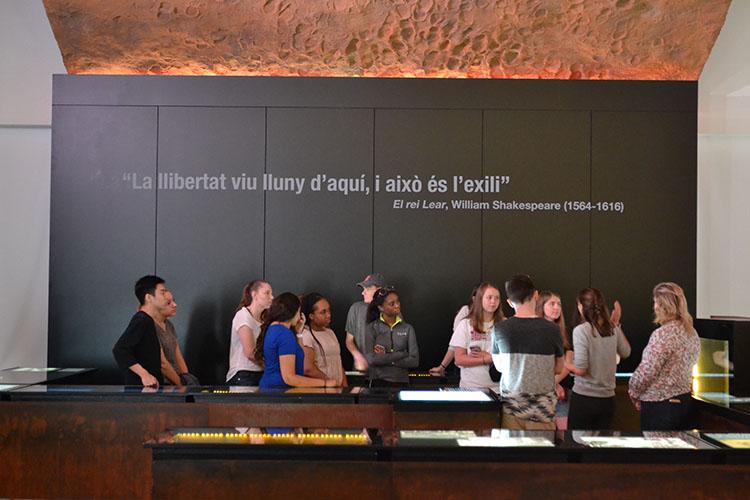While Shannon Duffy ’21 listened to a French tour guide describe the atrocities that took place at a site in the southern town of Collioure, she felt an overwhelming sense of “confliction.” The cheerful atmosphere of the region surrounding her starkly contrasted with its tragic, yet rarely discussed, history.
An undeclared environmental biology major from Woodstock, Vt., Duffy journeyed throughout France with her fellow first-year Benton Scholars last May to study the development of contemporary internment practices now applied to refugees in the 21st century.
The Benton Scholars program selects students from the incoming class who demonstrate passion and a clear potential for tackling complex, global issues throughout the undergraduate experience at Colgate and beyond. They delve into a global issue or event throughout their first academic year and, during the subsequent summer, visit a region relating to the course.
This year’s cohort, led and taught by George R. and Myra T. Cooley Professor of Peace and Conflict Studies and Professor of Geography Daniel Monk, grappled with what Monk calls an “unacknowledged history of the denial of rights.”
“[Our] entire year focused on the question of forced migration, either indirectly or directly,” Monk said. “The trip was used as a research component toward the completion of a shared, collective project.”
“One of the big takeaways that I think the whole class experienced was how invisible this history was in France,” said Duffy. “We often saw small museums, sometimes who did not even have full-time staff, but were dedicated to talking about France’s history of internment.”
Throughout the two week–long venture, students compiled information drawn from coursework, artifacts, and field research to construct a series of faculty reviewed journal articles. The articles were then combined into a 15-piece collection, titled “The Making of the Modern Internment Regime,” and published on Medium.com.
The installments all follow the same pattern, drawing on data and featuring student-created videos to further discussion.
Jake Gomez ’21, a Middle Eastern and Islamic studies and peace and conflict studies double major, describes the “extremely collaborative” experience as a lesson in understanding the ways curriculum informs larger society.
“This curriculum is real life,” Gomez said. “We know dates, we know facts, we know numbers. Yet the only way we were able to really understand and produce our work is because our curriculum contextualized the experience for us.”
Leila Ismaio ’21 agrees that this hands-on learning experience added further depth to her comprehension of the coursework.
“While there, many of the people who showed us around had ties to the region and to the history they discussed,” Ismaio said. “It is easy to forget how history does not just remain in the past but has legacies and influences the present.”
This direct engagement, Gomez explains, not only motivated him and his classmates to combat the “lack of monuments, respect, and acknowledgment,” with their research but also highlighted the role history plays in shaping modern society.
“Our research put in perspective for me the steps that led to the way refugees and population movements are handled today,” said Gomez. “The birth of refugee policy and management is documented by our work. I feel like I now have an array of academic tools to address and talk about what is happening in our world today.”
